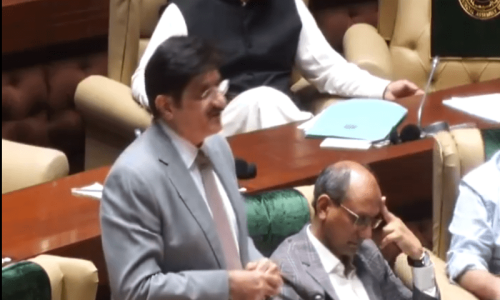
THOUGH the Arabic word ‘hakeem’ now in Urdu means a practitioner of eastern medicine or physician using traditional therapies to cure the ailing, it literally means wise and sagacious. Another connotation of the word ‘hakeem’ denotes a person with great knowledge, a philosopher or a polymath.
In olden days physicians and medicine men were called ‘hakeem’ as they did not only possess the knowledge of medicine and therapeutic sciences but also had command over several other fields such as pharmacy, pharmacopeia, biology, chemistry, psychology, philosophy, languages and literature. So ‘hakeems’ were supposed to have mastered many disciplines and they usually knew several languages, which simply made them polymaths. A symbol of culture and traditional wisdom, a ‘hakeem’, in true sense of the word, is now extremely hard to come by. Most of the professionals posing as ‘hakeem’ these days are either quacks or impostors selling aphrodisiacs.
Among the last few true ‘hakeems’ left in our society was Hakeem Syed Mahmood Ahmed Barkati. He was not only an expert medical practitioner but had also profoundly studied several branches of knowledge. With an exhaustive and in-depth knowledge of history, religion and literature, Mahmood Barkati was simply a polymath that we could find only in the pages of history now. This writer had had the honour of meeting Hakeem Barkati sahib on a few occasions and felt that he was one of the perfect examples of the hakeems of the yore years. Attired in a typical eastern style — complete with pyjamas, sherwani and Jinnah cap — Barkati sahib was an epitome of culture, courtesy, scholarship, etiquettes and traditional values that we can now only hear of or read about, not to mention the medicinal science that was naturally his forte.
In addition to being a compassionate, competent and committed physician, Hakeem Mahmood Ahmed Barkati was a research scholar, historian, translator, poet and a prose writer who knew English, Arabic, Persian, Urdu and Hindi. Mahmood Ahmed Barkati was born in October 1926 in the former princely state of Tonk, Rajputana, which was later included in the Indian state of Rajasthan. His grandfather, Syed Barkat Ahmed (died 1928), and his father, Syed Muhammad Ahmed (died 1932), both were expert in eastern medicines and polymaths appointed as special physicians to the nawabs of Tonk. Hakeem Mahmood Barkati was educated at Tonk and Delhi, both in eastern medicine and religious studies. In 1952, he migrated to Pakistan and began his practice at Karachi.
According to Mazhar Mahmood Sherani, Barkati sahib’s first book was Nishan-e-rah (1955). Barkati sahib had written pen sketches, too, which were collected by Sherani sahib and published in 2009, titled Jaada-i-nisyaan. Mir Muhammad Hussain, an Indian who later came to be known as ‘Londoni’ because of his travel to London in the 18th century, had written a travelogue in Arabic. It was titled Mushahidaat-i-Farang. Mahmood Barkati translated it into Urdu and it was published from Lahore’s Maghribi Pakistan Urdu Academy in 2010. Though many other scholarly works by Mahmood Ahmed Barkati have been published, a large number of his research articles on history, religion, literature and criticism remained either unpublished or buried in the pages of journals. Now a collection of Mahmood Barkati’s articles and essays has been compiled by his son Prof Dr Suhail Barkati. It is titled Maqalat-i-Barkati and Lahore’s Aks Publications have published it. In the preface to the book, renowned scholar Prof Dr Mazhar Mahmood Sherani has given Mahmood Barkati’s brief life sketch and has introduced his works. It is indeed a useful piece and gives some basic infomation on Barkati sahib. Mazhar Mahmood Sherani is Hafiz Mahmood Sherani’s grandson and the Sheranis also belonged to Tonk.
Maqalat-i-Barkati is a collection of over 75 articles. It has some sections that are named according to their subjects. Beginning with Prophet Muhammad’s (PBUH) life and his views on medicine and health sciences, the book proffers some very important articles on historical personalities and historic events, too, such as Shah Waliuallah, Fazl-i-Haq Khairabadi and Abdul Haq Khairabadi. Another portion discusses some literary personalities. The section on medicine and Islamic science of healing has some interesting and thought-provoking pieces of information. The book has some critical articles and book reviews, too. Barkati was a no-nonsense type of scholar and has always been very careful about what he wrote. So the book, with authoritative references, is simply a reliable and authentic work on history and traditional eastern medicine.
Some other books by Mahmood Barkati are: Fazl-i-Haq Khairabadi aur 1857, Shah Waliullah aur un ka khandan, Safar-o-talaash, Hayat-i-Shah Muhammad Ishaq Muhaddis Dehlvi, Maulana Moinuddin Ajmeri, Kashkol-i- Barkati, Muntakhab maqalat and Seerat-e-Fareediya. Mazhar Mahmood Sherani has mentioned that Some of Mahmood Barkati’s works still remain unpublished, which include Qarabdin-i-Barkati (‘qarabadin’ means pharmacopeia), Al-asbaab-o-alamaat, Barr-e-azeem mein tib ka qadeem irtiqa and Aaina-i-aflaak.
Hakeem Syed Mahmood Ahmed Barkati was targeted by unknown assailants in Karachi on Jan 9, 2013 and died from the gunshot wounds.
Published in Dawn, March 18th, 2019














































Dear visitor, the comments section is undergoing an overhaul and will return soon.